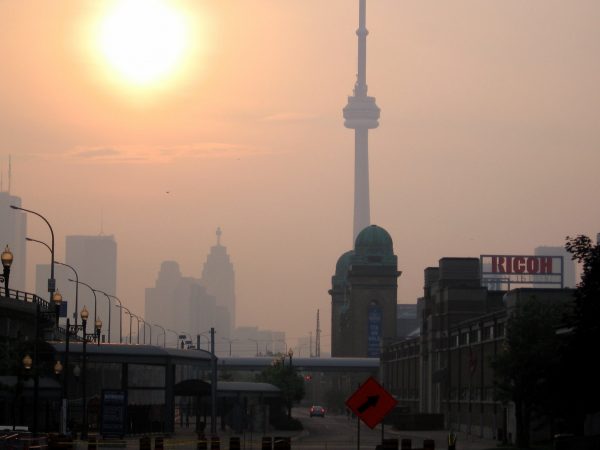
With 102 candidates on a ballot that may look more like a scroll than anything else, you’d think someone would be talking about carbon, and what the city is — or isn’t — doing to put meat on the bones of Toronto council’s 2019 declaration of a climate emergency.
However, among the top tier candidates, only Josh Matlow has put out a climate platform, but the topic hasn’t really come up in the campaign’s cut-and-thrust, which is weird because, well, we’re clearly in climate crisis.
Matlow’s environment policy, which he released on, you guessed it, Earth Day, is actually pretty good. He’ll impose a corporate parking levy (the omission of retail and industrial lands seems vaguely problematic) and use the $200 million in proceeds to boost the city’s Net Zero strategy. Establishing a fiscal link between climate investments and parking disincentives is the right way to get the environmental policy arrows pointing in the right direction.
His plan also calls for large new commercial and multi-unit residential buildings to use entirely electric heating and cooling systems by 2028 — a gutsy move — and then re-iterates more conventional municipal greening pledges, like spending on energy retrofits and expanding the city’s electric vehicles fleets. Matlow, finally, is the only candidate who’s making political hay out of the Ford government’s opportunistic indifference towards the greenbelt.
As for the others, there’s not much to report in terms of specific proposals, besides the usual calls for more transit. Frontrunner Olivia Chow’s plan is silent — surprisingly, given her past advocacy — on climate, as is Ana Bailao’s. Brad Bradford, who, as a planner, should be talking about issues like intensification and transit, has no specific policies. Neither, obviously, does Mark Saunders. Chloe Brown wants to turn the science centre into a hub for climate research.
The City’s climate plan, it should be said, isn’t terrible. TransformTO has some solid goals, and links to other promising policies, from the Toronto Green Standard for new buildings to innovative circular economy experiments, such investments in recycling waste heat from sewer mains. For what it’s worth, much of this work got approved while John Tory was mayor.
But the implacable obstacle on the rocky road to net zero is the cold fact that 54% of Toronto’s overall emissions come from natural gas used for space and water heating, and cooking. And a huge portion of that carbon gets burned in the furnaces and water heaters of residential homes that are hard-wired into the city’s extensive natural gas network.
If whomever wins on June 26 reaches for Matlow’s notion of using a parking levy to cut carbon, they should direct those dollars at two specific goals related to natural gas dependency.
First, some of that money ought to go towards providing incentives for homeowners to buy air source heat pumps. The demand for these devices is growing, and a municipal grant or loan program, on top of the other subsidies offered by Ottawa and soon the province, will add momentum to this long-term conversion of our residential energy infrastructure.
Second, the balance of those funds should help decarbonize Toronto’s rental stock. The city, in fact, is on the cusp of a generational opportunity to achieve such reductions, but council needs to connect the dots. One of the best ways of getting a double bang for the policy buck is for the city to deploy both carrots and sticks to drive electrification and energy efficiency investments in rental housing and especially affordable rental. Lowering operating outlays for energy in purpose-built rental buildings, be they private, public or non-profit, will relieve some of the inflationary pressures on rents, which helps tenants. Put another way, affordable rental and energy efficiency are parallel and mutually reinforcing goals. It’s great to hear all the talk in the election campaign about stoking the affordable rental housing sector. It would be even better to hear the candidates set out ideas for tethering that critical goal to our carbon strategy.
Finally, the next mayor must push Toronto Hydro, which is wholly owned by the City, to sharply accelerate its efforts to upgrade the local grid to prepare the city for the electrification that will enable so many of the other elements of Toronto’s net zero plan. The utility needs to make major capital investments in its infrastructure and distribution grid to accommodate both the additional demand for power and new renewable energy sources. The sooner we can start re-investing some of the city’s Toronto Hydro dividend into these projects, the better.
Toronto council is not oblivious about climate, but there’s little doubt the city needs to do much more if we want to achieve net zero by 2040 or thereabouts. The next mayor has the opportunity (and obligation) to accelerate this transition. But to get there, we’re first going to have to hear the candidates’ ideas about climate. And so far, that conversation isn’t happening.





One comment
Thank you, John, for the very helpful, necessary article about the absence of proposals about the climate crisis by all the Toronto mayoral candidates with the exception of Josh Matlow.
I haven’t seen or heard mention of climate in the campaign so far.